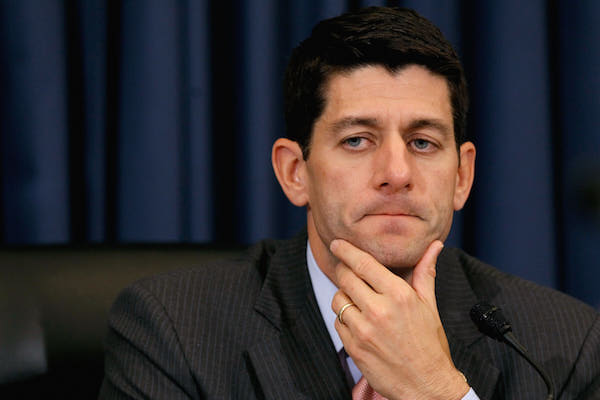
Rep. Paul Ryan (R–WI) pretends to think about your birthday present, but you’re getting an iTunes gift card.
If you want to feel superior and depressed at the same time, read this New York Times story on the budget plan House Republicans submitted last week. The good news is that it balances the federal budget by 2025. The bad news is that it does so by assuming $147 billion in additional revenue from the “macroeconomic effect” of the budget itself. It also repeals the Affordable Care Act and the taxes that support it, but still includes $1 trillion in revenue from those taxes. Finally, it counts $1 trillion in savings from unspecified cuts to social welfare programs. Don’t worry, though: there’s a $40 billion increase in defense spending next year, couched as “emergency war spending” so as not to violate the 2011 Budget Control Act. We’ll find the war later. As Rep. Rob Woodall (R–GA) of the House Budget Committee put it, “A budget is a moral document; it talks about where your values are.”
Before you start hoarding food stamps, remember that this budget absolutely will not become law. President Obama is not going to sign a bill that repeals his primary legislative achievement, privatizes Medicare and turns Medicaid into block grants for the states. But even that point is moot, since the House Republican budget probably won’t even get past Republicans in the Senate.
John McCain told the Times that his colleagues were within their rights “if the House wants to act that way,” but the proposal was “not legitimate budgeting.” Between its political untenability, its assumption of dramatically increased revenue, and its apparent violation of military spending caps, McCain seems to be right.
So what does this budget do, exactly? As Woodall suggested, it asserts values. Among those values, three are particularly striking.
- Faith in the Laffer Curve. Even though there is little evidence to support this theory, it is an article of faith among contemporary conservatives that lower taxes stimulate economic growth. The House budget quantifies this assumption at $147 billion from an economy so robust that fewer points on the package generate much more revenue.
- Dogged opposition to federal everything. You know Republicans don’t expect this budget to pass, because they’ve gone ahead and attached total repeal of Obamacare—a poison pill for any legislation since 2010. At that point, they might as well dismantle Medicare and Medicaid, two federal programs that have been in place since the Johnson administration. The implication is that the shape of federal government won’t revert 50 years in a stroke, but it should.
- Overriding commitment to defense spending. This budget contorts itself in a number of ways to balance by 2025, but cutting defense spending is not one of them. Instead, it assumes a war next year and/or declares a military emergency to get $40 billion to the Pentagon right away. As James Inhofe (R–OK) said about such spending, “My main concern is getting the numbers up, whatever it takes.”
When you look at it this way, in the context of a Washington DC where it will not become law, this budget proposal is a striking declaration of orthodoxy. Under a Democratic president, after a series of the least productive congressional sessions in history, House Republicans have committed to a plan that is reactionary even by the standards of their own caucus.
Maybe that’s the giddy intellectual freedom that comes from knowing you’re not making real laws. When I think about how things will be when I become supreme leader of the United States, I picture the device that makes your car explode if you honk the horn for more than four consecutive seconds, because there is no danger of that happening.1 Probably, House Republicans knew they were producing a work of speculative fiction, and they portrayed their fantasies accordingly.
Either that or they actually believe a version of this budget might become law. That prospect is terrifying—not because it might happen, but because people who believe it could are not likely to do good in Washington. If this document reflects the concrete plans of House Republicans, things are going to get worse before they get better.
But I’m an optimist, so I believe in explanation one. Probably, House Republicans will look back on this budget proposal as a half-remembered dream, producing only a feeling that vanished with the dew. Or they’ll shut down the government until they get that $40 billion emergency war. We’ll know in October.



